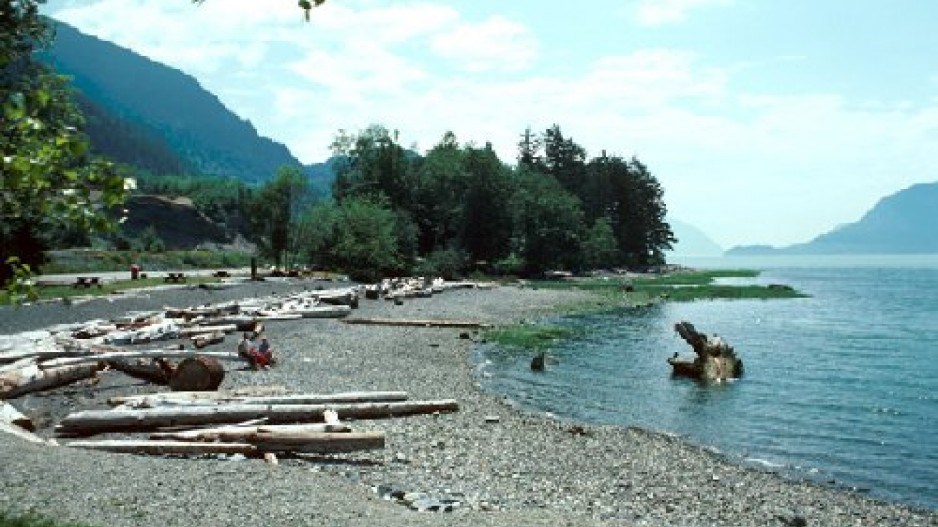(April 20, 1:00 p.m.: This story has been updated to include the memo that was leaked to Business in Vancouver.)
All it took was a dollar for Concord Pacific to buyout the Squamish Nation from prime Howe Sound land they were planning to develop together.
The band and the developer were going to create a master-planned community of 1,400 single, multi-family and mixed-use homes on 471 hectares south of Porteau Cove Provincial Park.
A 2010 entry in the province’s Major Projects Inventory said the project was worth $200 million and estimated it would be finished by 2016.
Instead, a new round of finger-pointing is in full-swing. A March 30 memo from a band council member blamed the Squamish Nation’s law firm, Ratcliff and Company, for losing the asset.
Coun. Richard Baker based that on a preliminary opinion from his lawyer at DLA Piper, according to a copy of his memo that was leaked to Business in Vancouver.
Councillor Baker Memo by BobMackin
It all began in 2000 when the NDP provincial government granted the Squamish Nation an option to buy land near Porteau Cove. It did so in 2004, through the numbered company 602297 BC Ltd., in a $10.1 million transaction with BCR Properties. Concord Pacific’s Adex division paid $505,000; the rest was a $9.595 million take back mortgage.
Their 2005 agreement said the Squamish Nation was not required to loan money or make a capital contribution to the project, but it included a buy/sell clause.
Interim development expenses were $19.8 million by October 2008, when the partnership bought the land from the numbered company for almost $61.4 million. In early 2009, Squamish Lillooet Regional District rezoned the property.
By April 2010, Concord had loaned $29 million to the project. After the Squamish Nation balked at Concord’s proposal to invest $15 million, Concord invoked the buyout clause for $1 in August 2011. Squamish didn’t respond or make a counter offer. By June 2013, Concord delivered the $1 cheque to Ratcliff.
By the end of November 2013, the Squamish Nation had found new partners, Bethel Lands and Matthews Southwest, the companies that plan to develop the Squamish Oceanfront Lands. Offers and counter-offers were made, including a $40 million offer by Squamish Nation that Concord rejected.
Arbitration loomed.
Concord formally removed Squamish Nation from the partnership in August 2014. Hearings planned for May have been cancelled.
“Arbitration is being shut down,” Concord executive vice-president Matt Meehan said in a brief interview. “We have bought the project for the costs that have been expended to date, since we started this in 2004 or 2005. The dollar is a nominal amount. It’s a dollar plus all the expenses we spent. Our partner did not submit an offer when we were going through this issue between the two partners.”
Neither Squamish Nation Chief Gibby Jacob nor Chief Ian Campbell responded to interview requests. Ratcliff managing partner Greg McDade declined comment. He forwarded a prepared statement, attributed to Campbell, that supports the law firm over Baker.
“The March 30 memo from Councillor Richard Baker is mistaken in the understanding of the facts. The Nation has recently reviewed this in depth, and Council fully supports the actions taken by previous Councils – and by Ratcliff on their instructions – on the Porteau Lands,” said the Campbell statement. “We will be shortly putting out a full explanation to our members. Council decided we did not want to take on the full liability on these lands. We remain dissatisfied with the actions of Concord as our former partner, but are moving forward.”
On April 18, the band published on its website a six-page update to members, claiming a “lack of value in the land” caused the Nation to walk away from years of negotiations with Concord with what it claimed was a $2.9 million profit.
“The partnership stalled because the market went bad, and Concord couldn’t justify paying 100% of the ongoing costs (i.e. mortgage interest) or investing any more infrastructure funds without the Nation agreeing to take on some of the risk and therefore having to provide significant cash to support the development moving ahead.”
Asked when or if the land would be developed, Meehan would say only: “that’s a whole different story” before he ended the brief interview.




